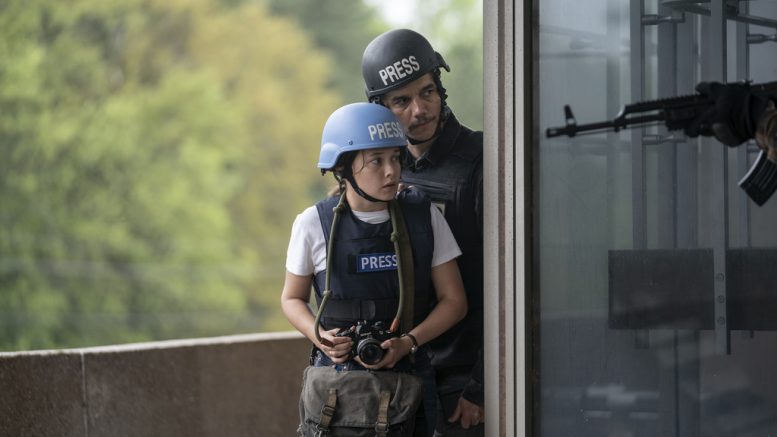The Associated Press
The United States is crumbling in Alex Garland’s sharp new film “Civil War,” a bellowing and haunting big screen experience. The country has been at war with itself for years by the time we’re invited in, through the gaze of a few journalists documenting the chaos on the front lines and chasing an impossible interview with the president.
Garland, the writer-director of films like “Annihilation” and “Ex Machina,” as well as the series “Devs,” always seems to have an eye on the ugliest sides of humanity and our capacity for self-destruction. His themes are profound and his exploration of them sincere in films that are imbued with strange and haunting images that rattle around in your subconscious for far too long. Whatever you think of “Men,” his most divisive film to date, it’s unlikely anyone will forget Rory Kinnear giving birth to himself.
In “Civil War,” starring Kirsten Dunst as a veteran war photographer named Lee, Garland is challenging his audience once again by not making the film about what everyone thinks it will, or should, be about. Yes, it’s a politically divided country. Yes, the President (Nick Offerman) is a blustery, rising despot who has given himself a third term, taken to attacking his citizens and shut himself off from the press. Yes, there is one terrifying character played by Jesse Plemons who has some pretty hard lines about who is and isn’t a real American.
But that trailer that had everyone talking is not the story. Garland is not so dull or narratively conservative to make the film about red and blue ideologies. All we really know is that the so-called Western Forces of Texas and California have seceded from the country and are closing in to overthrow the government. We don’t know what they want or why, or what the other side wants or why and you start to realize that many of the characters don’t seem to really know, or care, either.
This choice might be frustrating to some audiences, but it’s also the only one that makes sense in a film focused on the kinds of journalists who put themselves in harm’s way to tell the story of violent conflicts and unrest. As Lee explains to Cailee Spaeny’s Jessie, a young, aspiring photographer who has elbowed her way onto their dangerous journey to Washington, questions are not for her to ask: She takes truthful, impartial pictures so that everyone else can.
“Civil War” a film that is more about war reporters than anything else — the trauma of the beat, the vital importance of bearing witness and the moral and ethical dilemmas of impartiality. Dunst’s Lee is having a bit of an existential crisis, having shot so many horrors and feeling as though she hasn’t made any difference — violence and death are still everywhere. She’s also a pro: Hardened and committed to the story and the image. Her colleague Joel (Wagner Moura) is more of an adrenaline junkie, chasing the gunfire and drinking himself into a stupor every night. There’s Jessie (Spaeny), the wide-eyed but ambitious newbie who is in over her head, and the aging editor Sammy (the great Stephen McKinley Henderson), wise and buttoned up in Brooks Brothers and suspenders, who can’t imagine a life outside of news even as his body is failing him. All are self-motivated and none of them have a life outside of the job, which might be a criticism for some movie characters but not here (trigger warning for any journo audiences out there).
The group must drive an indirect route to get from New York to Washington as safely as possible, through Pittsburgh and West Virginia. The roads and towns are set-dressed a little bit, but anyone who knows the area will recognize familiar sights of dead malls, creaky off-brand gas stations on two lane roads, boarded up shops and overgrown parking lots that all work to provide an unsettlingly effective backdrop for the bleak world of “Civil War.”
Dunst and Spaeny are both exceedingly good in their roles, effectively embodying the veteran and the novice — a well-written, nuanced and evolving dynamic that should inspire post-credits debates and discussion (among other topics).
Dread permeates every frame, whether it’s a quiet moment of smart conversation, a white-knuckle standoff or a deafening shootout on 17th street. And as with all Garland films it comes with a great, thoughtful soundtrack and a Sonoya Mizuno cameo.
Smart, compelling and challenging blockbusters don’t come along that often, though this past year has had a relative embarrassment of riches with the likes of “Dune: Part Two” and “Oppenheimer.” “Civil War” should be part of that conversation too. It’s a full body theatrical experience that deserves a chance.
“Civil War,” an A24 release in theaters Friday, is rated R by the Motion Picture Association for “strong, violent content, bloody/disturbing images and language throughout.” Running time: 119 minutes. Three stars out of four.




































